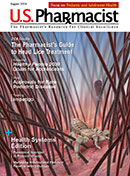Many older adults who know about new RSV vaccines expressed interest in getting one, but overall awareness remains relatively low.
That is according to a recent survey from the University of Michigan (U-M), which also uncovered differences by age, gender, health status, and levels of education and income when it comes to new vaccine awareness and interest among adults aged 60 to 80 years.
The survey determined that nearly one-half of older adults do not know about the new RSV vaccines that received approval earlier this year. In addition, some groups of older adults show much lower interest in getting the RSV vaccine than others.
The new information comes from a poll administered July 17, 2023, through August 7, 2023, to 1,850 people aged 60 to 80 years who answered the question about awareness of the RSV vaccine. The poll organizers reported that 1,817 of them also answered the question about interest in receiving it.
Overall, 52% of respondents between the ages of 60 and 80 years had heard the new vaccine option was coming, according to the new data from the National Poll on Healthy Aging gathered in July 2023.
The vaccines are now available in pharmacies nationwide. In May 2023, the FDA approved the first vaccines for prevention of RSV-associated lower respiratory tract disease in adults aged 60 years and older. The first one approved, RSVPreF3 (Arexvy, GSK), is a one-dose (0.5 mL) adjuvanted (AS01E) recombinant stabilized prefusion F protein (preF) vaccine, and RSVpreF (Abrysvo, Pfizer) is a one-dose (0.5 mL) recombinant stabilized preF vaccine.
As to their interest in being vaccinated, 21% of those answering the poll said they were very interested, and another 43% said they were somewhat interested.
While RSV is most risky to older adults who have lung, heart, kidney, or immune system conditions, or diabetes, and those who live in nursing homes or other group settings, awareness of the vaccine was relatively low (41%) among older adults who described their health as “fair or poor.” On the other hand, awareness was 53% among those who rated their health as “good to excellent.”
More than 65% of those with a chronic health condition said they were very or somewhat interested in getting the vaccine, despite knowledge of it previous to the poll.
Interest in getting vaccinated increased with age, with 70% of respondents aged in their 70s stating that they were very or somewhat interested in getting vaccinated, compared with 60% of those aged in their 60s.
“As we prepare for the first RSV season when a vaccine will be available for older adults, these early data suggest a need for public health officials, primary care providers, pharmacies and others to target their outreach and awareness-building efforts,” explained Preeti Malani, MD, senior advisor to the poll and a physician at Michigan Medicine, U-M’s academic medical center.
“We found an association between awareness and interest, with 68% of those who had heard of the vaccine saying they were very interested or somewhat interested in getting vaccinated, compared with 60% who hadn’t heard of the vaccine until asked by the poll team,” Dr. Malani added.
The poll is based at the U-M Institute for Healthcare Policy and Innovation and supported by AARP and Michigan Medicine.
In other findings:
• More women (57%) than men (46%) had heard of the RSV vaccine, but there was no significant gender difference in interest in being vaccinated
• 56% of those with a bachelor’s degree or higher had heard of the vaccine, compared with 46% of those with some college or less
• 55% of those with annual household incomes over $60,000 had heard of the vaccine, versus 47% of those with incomes below that threshold
• Those with a college degree (68%) and those in higher-income households (66%) were more likely to say they are somewhat interested or very interested in getting an RSV vaccine compared with those with fewer years of education (58%) or in lower-income households (60%)
• While there were no significant observed differences in vaccine awareness among those of different racial or ethnic backgrounds, some differences were identified when it came to interest in vaccination: 65% of white, non-Hispanic respondents said they were somewhat interested or very interested, compared with 56% of black and 56% of Hispanic respondents.
The content contained in this article is for informational purposes only. The content is not intended to be a substitute for professional advice. Reliance on any information provided in this article is solely at your own risk.
Published September 7, 2023






